 Yes, indeed. It’s nice to have a friend like Max Brod (1884-1968) who is best known for his historical novels, written in German and as the editor of Kafka’s writings.
Yes, indeed. It’s nice to have a friend like Max Brod (1884-1968) who is best known for his historical novels, written in German and as the editor of Kafka’s writings.
Watch video: Max Brod-“Paradies” (Words:Franz Kafka)
To the left is his book and below is the photo show dedicated to this book.
Here is an extract from it on page 39:
“For him nothing was ordinary, always and everywhere he expressed himself with his own peculiar gift of pregnant observation and simile. And this he did in a completely unforced manner without preciosity, with the most charming naturalness. At first sight Kafka was a healthy young man, admittedly remarkably quiet, observant, reserved. His spiritual bent was not in the direction of the morbidly interesting, the bizarre or the grotesque, but in that of the greatness of the nature, the curative, health-giving, sound, firmly established, simple things.
I have experienced over and over again that admirers of Kafka who know him only from his books have a completely false picture of him. They think he must have made a sad, even desperate impression in company too. The opposite is the case. One felt well when one was with him. The richness of his thoughts, which he generally uttered in a cheerful tone, made him, to put it on the lowest level, one of the most amusing of men I ever met, in spite of his shyness, in spite of his quietness. He talked very little…He could be enthusiastic and carried away and knew how to make his friends laugh, too. More than that, if one were in a tight corner, one could unhesitatingly rely on his knowledge of the world, his tact, his advice which hardly ever faild to be right. He was a wonderfully helpful friend.”
Few writers have been subject to the fate which was Kafka’s: to remain almost utterly unknown during life, after death to be rapidly lifted to world fame.
In the case of Franz Kafka, this fate cannot be considered so cruel, since he was a man utterly indifferent to fame. Writing was for him “a form of prayer” (as he put it in one of his diaries). His efforts were directed toward inner perfection, toward a stainless life. It was not that he did not care what the world thought of him; rather, he simply had not time to worry about it. For he was wholly occupied with the striving for the highest ethical pinnacle a man can attain-a pinnacle which in truth scarcely can be attained. He was filled with a drive, intensified to the point of pain and semi-madness, not to brook any vice in himself, any lie, any self-deception, nor any offence against his fellow men-this passion for perfection often took the form of self-humiliation, since Kafka saw his own weaknesses as though under a microscope, magnified to many times their size. How he despaired of himself on account of these weaknesses, longing as he did for intimate fusion with the Pure, the Divine, which in his aphorisms he described as the “Indestructible”. Yhis ideal preoccupied him throughout his life. In this sense, Kafka of all modern writers, is the one most closely akin to Tolstoy. “Man cannot live without a lasting trust in something indetructible within himself”-in this sentence Kafka formulated his religious position.
Nice to have a friend like Max Brod who understands you through.
Watch video: Franz Kafka-Mini Documentary
